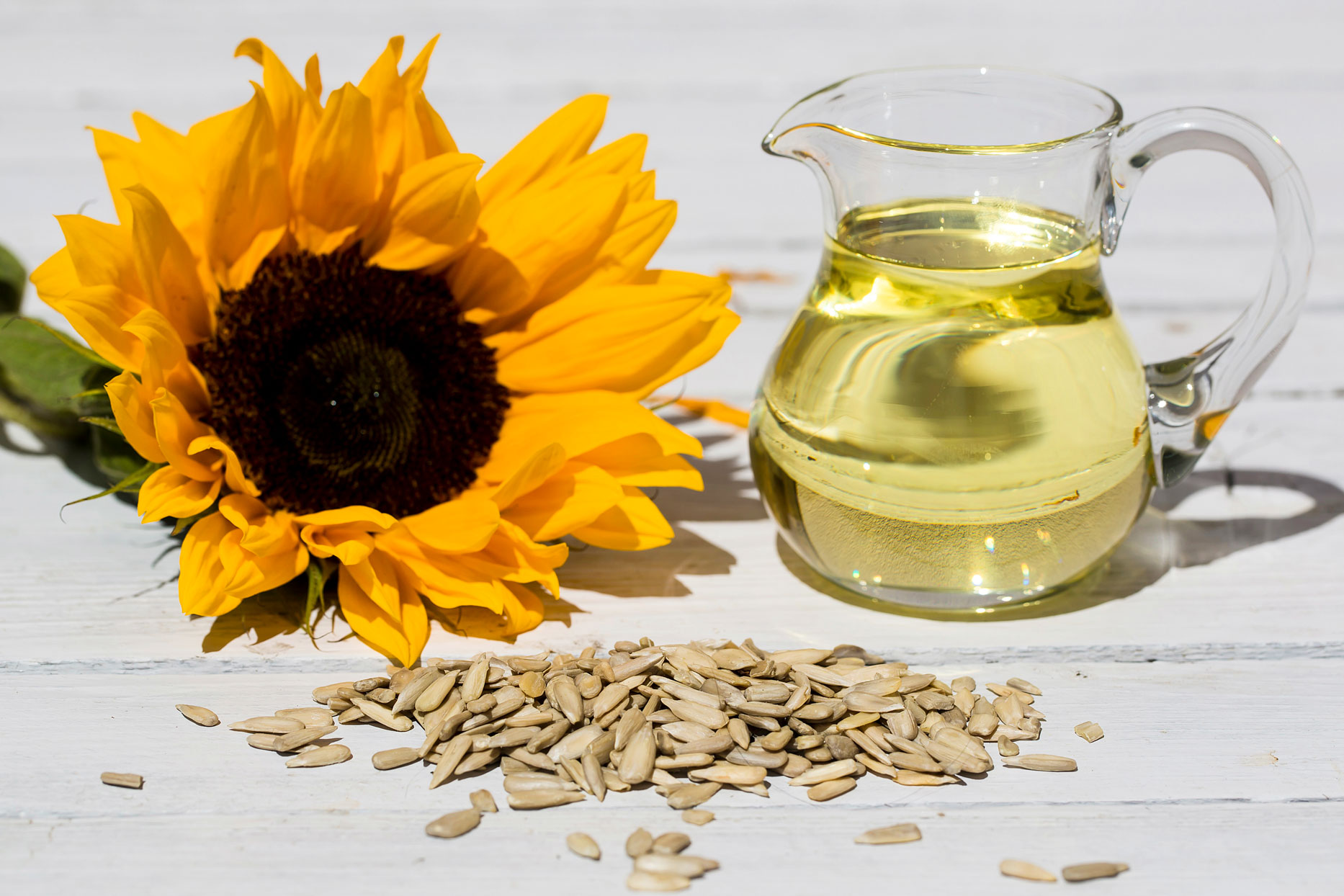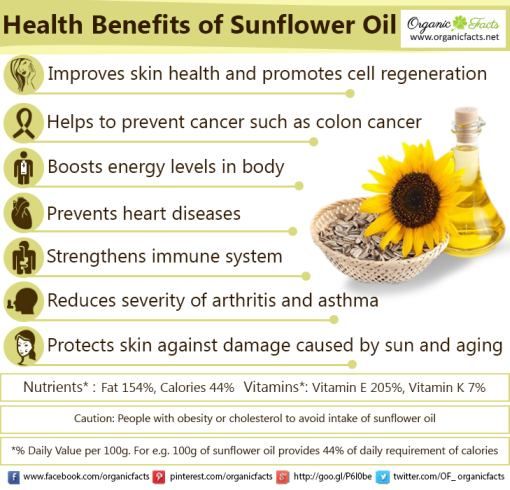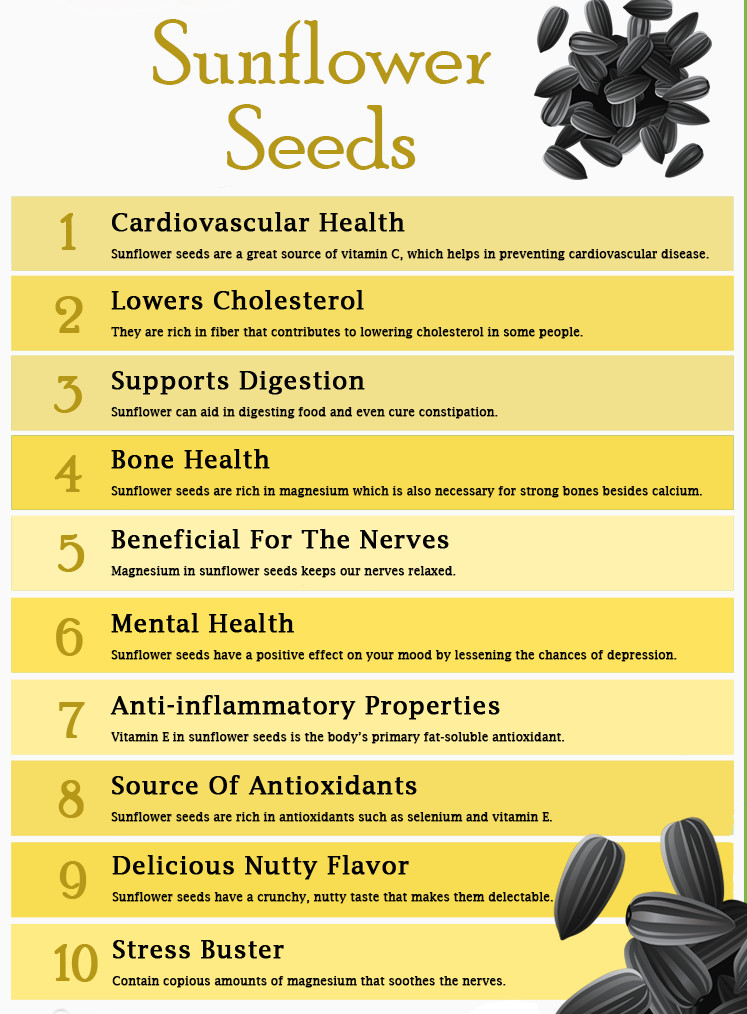
Sunflower: What is the benefit of sunflower oil?
Sunflowers are more than just the gorgeous yellow blooms that make a great bouquet. These large, lovely flowers create nutrient-dense seeds whose oil has an array of different uses in skin care.
Sunflower oil has been used as a natural skin care ingredient for hundreds of years all over the world, and it boasts a plethora of benefits. It encourages younger looking skin, boosts nourishment, and protects skin against the elements.
Sunflower oil is primarily composed of linoleic acid, a polyunsaturated fat, and oleic acid, a monounsaturated fat. Through selective breeding and manufacturing processes, oils of differing proportions of the fatty acids are produced. The expressed oil has a neutral taste profile. The oil contains a large amount of vitamin E.

How is Sunflower Oil Made?
Sunflower oil is made from pressing the seeds of the Helianthus annuus flowers, also known as sunflowers.
They can be pressed through the use of chemical solvents, or they can be cold-pressed at lower temperatures without the use of any chemicals.
When purchasing sunflower oil for skin care, always look for organic cold-pressed oil.
Uses & Effectiveness?
Possibly Effective for
- Heart disease. Using high-oleic acid sunflower oil instead of other dietary fats and oils higher in saturated fat might reduce the risk for heart disease. The US FDA allows high-oleic acid sunflower oil products to make this claim on their product labels.
- High cholesterol. Consuming sunflower oil in the diet might reduce low-density lipoprotein (LDL or “bad”) cholesterol levels in some people.

Possibly Ineffective for
- High blood pressure. Taking sunflower oil by mouth doesn’t seem to lower blood pressure in people with high blood pressure.
- There is interest in using sunflower oil for a number of other purposes, but there isn’t enough reliable information to say whether it might be helpful.
Special Precautions and Warnings
When taken by mouth: Sunflower oil is commonly consumed in foods.
When used as a mouth rinse: There isn’t enough reliable information to know if sunflower oil is safe or what the side effects might be.
When applied to the skin: Sunflower oil is likely safe when used for up to 6 weeks.
Pregnancy and breast-feeding: Sunflower oil is commonly consumed in foods. But there isn’t enough reliable information to know if sunflower oil is safe to use in amounts greater than those found in food when pregnant or breast-feeding. Stay on the safe side and stick to food amounts.
Children: Sunflower oil is commonly consumed in foods. But there isn’t enough reliable information to know if it is safe to take by mouth in larger amounts as medicine. Sunflower oil is possibly safe when applied to the skin for up to 2 months.
Allergy to ragweed and related plants: Sunflower oil may cause an allergic reaction in people who are sensitive to the Asteraceae/Compositae plant family. Members of this family include ragweed, chrysanthemums, marigolds, daisies, and many others.
Diabetes: A diet that is high in sunflower oil seems to increase fastinginsulin and blood sugar levels. It also seems to increase after-meal blood fats. This might increase the chance of developing “hardening of the arteries” (atherosclerosis) in people with type 2 diabetes.
Dosing
Sunflower oil is commonly consumed in foods. When it’s used as a substitute for other dietary oils, it’s recommended that adults consume 1.5 tablespoons of high-oleic acid sunflower oil daily.
As medicine, sunflower oil has been taken by mouth in varying doses. It’s also been applied to the skin and used as a mouth rinse. Speak with a healthcare provider to find out what type of product and dose might be best for a specific condition.
Reasons to Use Sunflower Oil
1. It hydrates.
Like the skin’s own natural oil, or sebum, sunflower oil is an emollient, meaning it adds hydration and smooths. That makes it a perfect moisturizer as it helps skin to retain water.
2. It’s rich in antioxidants.
Sunflower oil is rich in vitamin E, a protective antioxidant. It also contains vitamin A, vitamin C, vitamin K and vitamin D, which help to protect from environmental stressors that can cause premature aging.
3. It helps to unclog pores.
This smooth, nourishing oil is non-comedogenic, meaning it won’t clog pores. Sunflower oil can actually help to decongest pores by clearing them of dead skin cells and creating a refreshed, revitalized appearance.
4. It can minimize signs of aging.
With protective antioxidants and its ability to retain moisture, sunflower oil can help minimize the look of fine lines and wrinkles. It can also help protect your skin against further damage.
5. It’s soothing.
Sunflower oil is known for its ability to soothe irritated skin. It works for all skin types and provides gentle moisture and protection.

6. It can help calm temporary redness.
Sunflower oil can actually alleviate temporary redness in sensitive or dry skin.
7. It protects skin.
Sunflower oil provides a protective barrier against environmental stressors, helping your skin stay clean and free from dirt and toxins.
8. It can help even out skin tone and texture.
Easily absorbed into skin, sunflower oil can even out the look of your skin’s surface and even temporarily shrink the appearance of pores.
9. It’s a natural botanical ingredient.
All good things grow in the garden! Sunflower oil has been around for thousands of years and is free from nasty chemicals or toxins.
10. It’s gentle.
For those with sensitive or mature skin, sunflower oil is ideal as it is gentle on the skin and has calming properties.
11. Sunflower oil benefits for hair and skincare
Sunflower oil is very rich in vitamin E and vitamin A that act as antioxidants. It helps revive and renew damaged skin cells and eliminate acne-causing bacteria. Its texture is non-greasy and light, which helps the skin absorb it easily without blocking the pores. It can be used as a natural moisturizer for sensitive or dry skin. For dry and frizzy hair, sunflower oil can act as a conditioner that helps soften it and gives it a healthy and shining look. It’s also rich in gamma alpha-linolenic acid that is believed to prevent hair loss.
12. Sunflower oil supports the immune system
Being rich in antioxidants, sunflower oil helps strengthen your cell membrane to boost the body’s defence against bacteria and viruses. It also contains protein which aids in repairing tissues and building enzymes that help your body function properly.
Reference: leurandbee.com, www.webmd.com

Thanks lots for sharing…..
Good morning all guys ❣
I like the seeds of sunflower 🌻.. thanks lots for sharing knowledge.
That is very interesting, You are an overly professional blogger. I have joined your rss feed and look ahead to in search of more of your fantastic post. Also, I’ve shared your site in my social networks!
Thanks you
Done
Good
Thanks 👍👍👍👍👍
Done 🌲🎄🍒
👍👍👍
Ads ok🍒😊.
I like sunflower seeds 😁
Thanks for sharing
Thanks for knowledge sharing about sunflower oil!
Many thanks!
I like it
🌺💪💪💪
🍒✊✊✊
Thank you
good
Done.
Click
Ads no
Good night
Thanks for letting
Thanks for your article 🦾🍀
Good ads
Thanks much,
Good article.
Love clicker all.
Fighting
Done
😘😘😘😘
Good.
fighting
Thanks for sharing♡
Thanks, like it 💜
Thanks for sharing.
Yep!! Thanks millions.
I do like sunflower seeds.
Thanks a lot for sharing such knowledge.
Awwn,thanks!